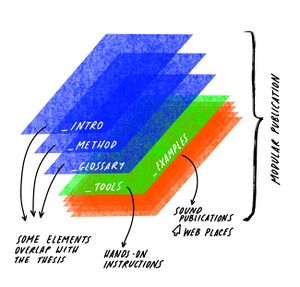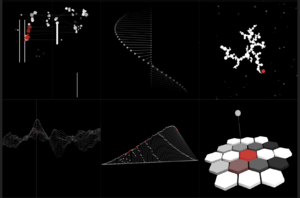Al's XPUB2 proposal draft: Difference between revisions
| Line 33: | Line 33: | ||
This project is also born out of the frustration of feeling oftentimes excluded from jamming sessions because of not being a “musician” (not having musical training). | This project is also born out of the frustration of feeling oftentimes excluded from jamming sessions because of not being a “musician” (not having musical training). | ||
The element of collective making is also an important entry point for me. I am interested in exploring opportunities for collaborative creative work. I aim at bringing and establishing some principles in my art and facilitation practice, such as: openness, inclusivity, and collectiveness. I want to create a safe space for experiments, where everyone is welcome, no matter if they have academical training in a particular medium, or not. | The element of collective making is also an important entry point for me. I am interested in exploring opportunities for collaborative creative work. I aim at bringing and establishing some principles in my art and facilitation practice, such as: openness, inclusivity, improvisation and collectiveness. I want to create a safe space for experiments, where everyone is welcome, no matter if they have academical training in a particular medium, or not. | ||
==<span style="color: white; font-family: Menlo; text-decoration:none; background-color: #0033ff; padding-top: 0.1vw; padding-bottom: 0.1vw; padding-left: 0.1vw; padding-right: 0.2vw;"> How do you plan to make it? </span>== | ==<span style="color: white; font-family: Menlo; text-decoration:none; background-color: #0033ff; padding-top: 0.1vw; padding-bottom: 0.1vw; padding-left: 0.1vw; padding-right: 0.2vw;"> How do you plan to make it? </span>== | ||
Revision as of 13:23, 15 November 2022
// back to Ål's main page
// back to Graduate Seminar
Questions
_What do you want to make? _How do you plan to make it? _What is your timetable? [stages] [deadlines] _Why do you want to make it? _Who can help you and how? _Relation to previous practice _Relation to a larger context _References/bibliography _Who is the work for (part of why do you want to make it)
What do you want to make?
A handbook presenting a method to produce and publish collective sound-based publications. This hands-on guide will explore and share various tools to facilitate sound-making and sound-publishing moments.
Sound can be an informative and important part of any artistic practice: research and final outcome. It is a strong medium for artists practising any kind of discipline and is often overlooked by visual artists, media designers and facilitators. Thus, this handbook aims at bringing another medium (or opening more possibilities for exploration of it) to mixed-media artists, designers and educators.
(Deep Listening) Sound Jams: Method of Producing Collective Sound-Based Publications [working title] is focusing on bringing deeper attention to sound in the ways we perceive it, and the way we respond with it. The method explores various ways to facilitate sound-making and publishing moments on the basis of “listen and respond”. The invitation is to analyse how deep listening affects sound jams.
Why do you want to make it?
Facilitation is a substantial element of my artistic practice. Since 2016, I am experimenting with various ways of creating time and space for people to try out new artistic tools, no matter their previous experiences and training. Visual arts and digital communication were mainly the focus of the tools I was researching, but as a mixed-media artist, I am interested in bringing sound more as a format in these laboratories. During the first academic year of my studies at Experimental Publishing, I already noticed my increased interest in using sound more in my artistic practice. Highlights of my research and experiments were the pieces made for Special Issue 18: Radio Implicancies; the care-taking process of facilitating and the editorial work for some weekly releases; as well as participation in improvisational jams with the other XPUB students. I also facilitated my first sound-based artistic residency in September 2022, which allowed me to bring a new medium in my facilitation practice, a medium that worked well in a group of people, and that was a completely new form of expression to many of the participants in the workshop.
This project is also born out of the frustration of feeling oftentimes excluded from jamming sessions because of not being a “musician” (not having musical training).
The element of collective making is also an important entry point for me. I am interested in exploring opportunities for collaborative creative work. I aim at bringing and establishing some principles in my art and facilitation practice, such as: openness, inclusivity, improvisation and collectiveness. I want to create a safe space for experiments, where everyone is welcome, no matter if they have academical training in a particular medium, or not.
How do you plan to make it?
[research of methods for collective sound-making] I would like to start with a research of collective-sound making methods that are already published by other artists. Also, I will look for examples and inspirations of sound publications. Which of the sound publications I find interesting are done by a collective, a group of people. What is their process?
[sound jam experiments] Simultaneously, I would like to test experiments of collective sound-making and publishing. Since I already have facilitated a few moments, I would like to reflect on them and create prototypes for publishing them - as a tool, part of the handbook; and as a sound publication, an example.
[research publishing tools] Researching tools for publishing, in connection with collective publishing practices. What are the ways to share sound-based creations? Which one of them can be or already are collaborative?
[put things together] Describing the tools for collective sound-based publications making - how can we make sounds together; what are the ways to listen better, to respond with sound, to publish our sound works, to do it collectively?
What is your timetable?
_1 // research of existing methods for collective sound-making & publishing
_2 // drafting, shaping, testing tools for collective sound-making and publishing
_3 // facilitating and documenting sound jams & creating prototyping publication modules out of them
_4 // revision, reflection, revisiting instructions, feedback
_5 // prototyping the publication (with printable and digital elements)
_6 // making the publication
_7 // presenting the publication (grad show)
Who can help you and how?
Relation to previous practice
Relation to a larger context
References/bibliography
WIP - what informs the research
reads
Oliveros, P., 2005. Deep Listening. New York. Deep Listening Publications. [annotated pad]
adrienne maree brown, 2019. Pleasure Activism. The Politics of Feeling Good. Chico, Edinburgh. AK Press. [annotated pad]
Evens, A., 2005. Sound Ideas: Music, Machines & Experience. U of Minnesota Press [annotated pad]
Kreidler, J. 2013. loadbang. Programming Electronic Music in Pure Data. 2nd edition. Hofheim: Wolke Verlag.
Weiss, A., 2001. Experimental Sound & Radio. The MIT Press.
Groot, M. 2019. The Amateur's Armour. [online] Available at: <https://underbelly.nu/wp-content/uploads/2015/04/The-Amateurs-Armour.pdf> [Accessed 11 October 2022].
sound publications
Brown, A. R., 2022. Beneath Maiwar.[online] Available at: <https://www.explodingart.com/arb/2022/06/28/beneath-maiwar/> [Accessed 30 September 2022]. [annotated pad]
Nagy, A., 2018. Hackpact / Sonification Studies. [online] Available at: <https://stc.github.io/HackPact/> [Accessed 30 September 2022]. [annotated pad]
Who is the work for?
_educators: people who are facilitating various educational activities and are looking for ways to bring more mixed media in their activities;
_artists: who are looking for new techniques for their practice and ways to experiment, boost their creative process; to find more ways to reflect over topics and contents;
Research places
wiki
▶ Al Nik's Hackpact
▶ Sound jams research
wip
▶ the first draft pad [created during the Graduate Seminar on 29-09-2022]
▶ jams ideas
▶ references - collective pad with Mitsa
▶ tagging and mapping research elements
▶ wikimedia setup - creating a space for collaborative work; for documentation and presentation of the sound-based publications from the research // work in progress
research pads
▶ glossary
▶ audiozines
▶ pure data
▶ live coding


